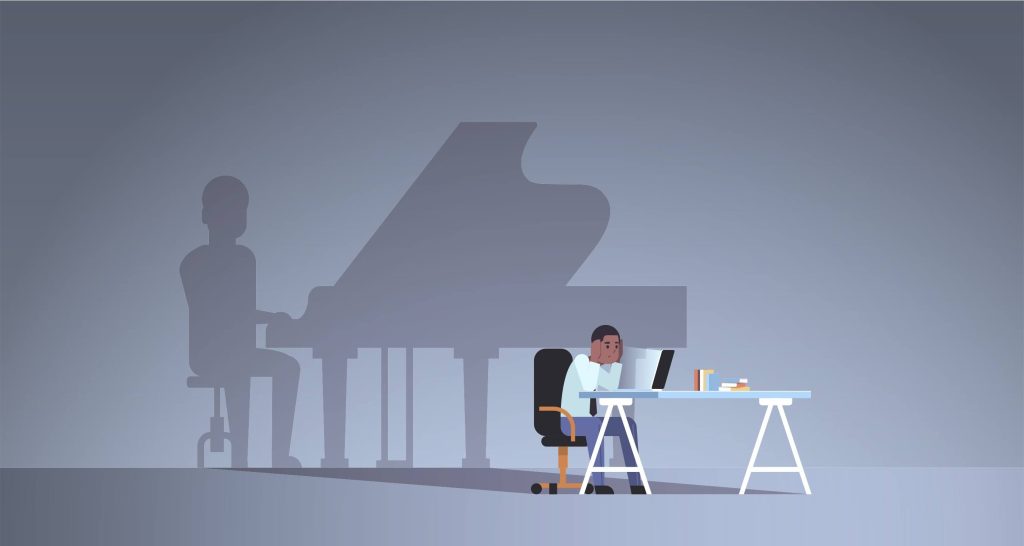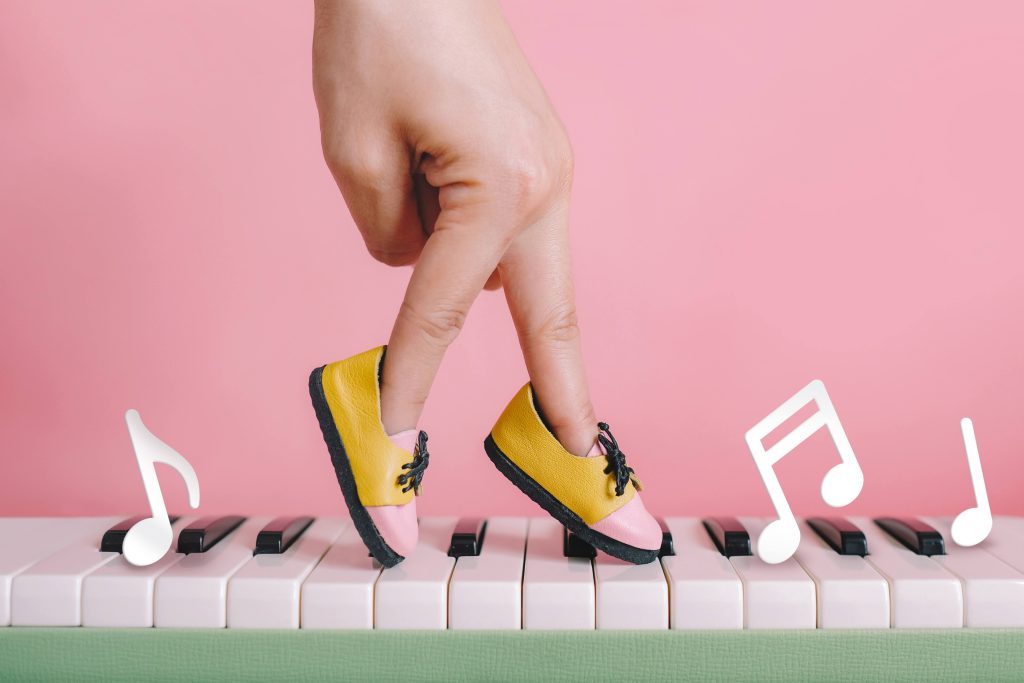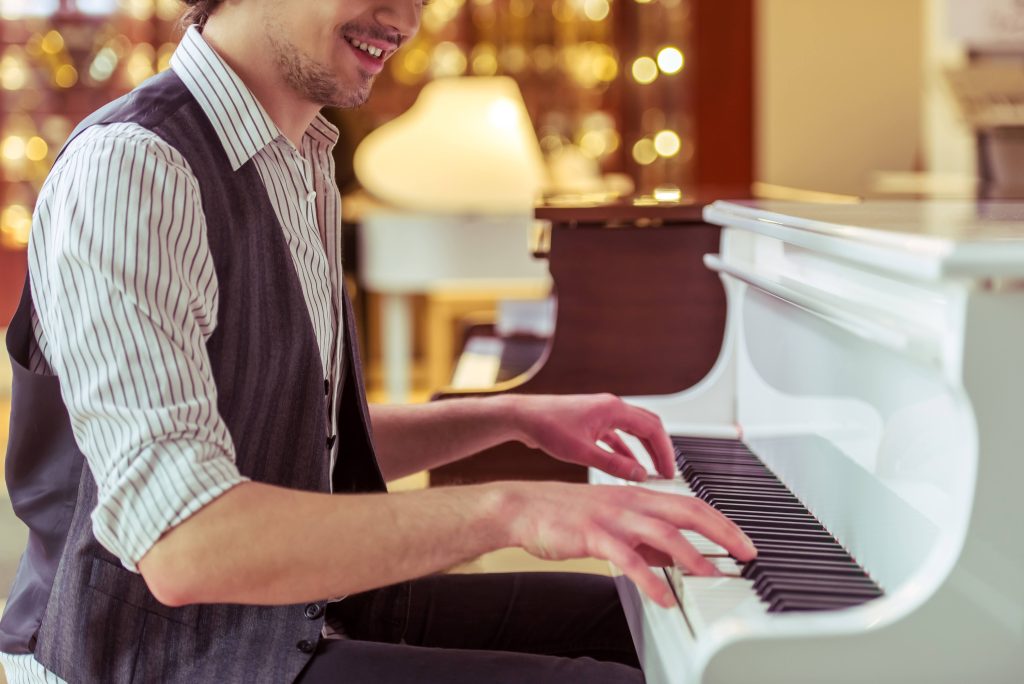Check out Pei-Chen Chen‘s presentation at NCKP 2023: The Piano Conference, It’s Never Too Late – Lived Experiences of Amateur Adult Piano Learners, on June 11, 2023 from 3:00-3:25PM during our online event. Register now for NCKP 2023!

1. They take lessons to fulfill a long held-dream.
Fulfilling a long-held dream is one of the most common motivations for adult piano students (P. J. Jutras, 2006; Kim, 2015; Parker, 2006; Polischuk, 2019; Uszler et al., 1999). Many career-aged adult piano learners delay piano study for different reasons, and they will often wait patiently until their life is ready. Common factors that affect their decision to learn include finding enough time to practice, having the physical space for a piano, and mental readiness.


2. They are self-motivated.
Adult learners are self-motivated and self-directed in their learning. While many young learners have extrinsic pressure and expectations from their parents and others (Fisher, 2010; Polischuk, 2019; Uszler et al., 1999), adults are more intrinsically motivated. Adult piano learners want to improve their piano playing with different goals in mind. Most of their motivations are internal, including the desire for a better quality of life, greater self-confidence, and self-actualization.
3. They like to make conscious and meaningful decisions in their learning.
Career-aged adult piano learners like to learn at their own pace, preferring an individualized curriculum with repertoire that they want to learn. They learn better when the lesson style is customized to fit their needs (MacKeracher, 2004). This means it is important for teachers and students to discuss method books and repertoire choices to create an engaging learning environment (Coutts, 2018; Mizok-Taylor, 2008).


4. They acknowledge the challenges of being an adult learner.
Career-aged adult piano learners acknowledge their mental and physical difficulties while learning and practicing the piano. Feeling mental frustration and discomfort in practice is a common issue for them. However, they are also able to recognize that frustration comes from their own self-judgment. They often hear their own “inner critic,” feel self-conscious, and have negative self-judgments while learning the piano. (Bissell, 1984; Fisher, 2010).
In addition to mental discomfort, career-aged adult piano learners may also experience physical challenges, including feeling a lack of coordination when playing the piano. Many piano educators also believe adults need more time to transfer theoretical knowledge into physical playing energy (Fisher, 2010; Kim, 2015; Polischuk, 2019; Uszler et al., 1999). Hand-eye coordination and the cognitive process of learning to read music are also common challenges adults may experience (Kim, 2015). This lack of coordination can cause career-aged adult piano learners to feel self-conscious and frustrated. The discomfort for adult piano learners is both mental and physical, and often mental aspects will influence physical aspects and vice versa.
5. They feel joy and make meaningful connections between music and life.
Despite the challenges of learning piano, career-aged adult piano learners enjoy playing music and having music in their lives. They find that being able to play music is meaningful and gives them a sense of joy. Sharing music with others and making social connections can also bring them joy. Many educators believe that music is a leisure activity, and adult students enjoy the social opportunity to interact and share music with others (Fisher, 2010; Kronish, 2005; McQueen, 2013; Polischuk, 2019; Uszler et al., 1999).


SOURCES
Bissell, P. M. (1984). “Group Keyboard and the Adult Market.” American Music Teacher, 34(1), 12–17.
Coutts, L. (2018). “Selecting Motivating Repertoire for Adult Piano Students: A Transformative Pedagogical Approach.” British Journal of Music Education, 35(3), 285–299. https://doi.org/10.1017/S0265051718000074.
Fisher, C. (2010). “Group Piano and the Adult Hobby Student.” In Teaching Piano in Groups (pp. 189–211). Oxford University Press.
Jutras, P. (2006). “The Benefits of Adult Piano Study as Self-Reported by Selected Adult Piano Students.” Journal of Research in Music Education, 54(2), 97–110. https://doi.org/10.1177/002242940605400202
Kim, K. R., Peter Jutras, Seon Joo. (2015). “Adult perspectives of learning musical instruments”— Kathryn Roulston, Peter Jutras, Seon Joo Kim, 2015. International Journal of Music Education, 33(3). http://journals.sagepub.com/doi/10.1177/0255761415584291
Kronish, N. B. (2005). “Social, cultural, and psychological influences on three promising piano students’ decisions to continue taking piano lessons” [Ph.D., McGill University (Canada)]. http://search.proquest.com/docview/305364045/abstract/173826EAF88C45AEPQ/12
MacKeracher, D. (2004). Making Sense of Adult Learning. University of Toronto Press Incorporated.
McQueen, M. V., Susan Hallam, Andrea Creech, Hilary. (2013). “Different ways of experiencing music-making in later life: Creative music sessions for older learners in East London” – Maria Varvarigou, Susan Hallam, Andrea Creech, Hilary McQueen, 2013. Research Studies in Music Education, 35(1). http://journals.sagepub.com/doi/10.1177/1321103X13478863
Mizok-Taylor, R. J. (2008). “Promoting self-directed learning in adult piano instruction” [D.M.A., West Virginia University]. http://search.proquest.com/docview/304448652/abstract/B327D2A3DC5F4856PQ/1
Parker, E. (2006). Piano Pedagogy: A Practical Approach. Longbow Pub
Polischuk, D. K. (2019). “Teaching Adult Pianists.” In Transformational Piano Teaching (pp. 21– 35). Oxford University.
Uszler, M., Gordon, S., & McBride-Smith, S. (1999). “The Adult Student.” In The Well-Tempered Keyboard Teacher (2nd ed. edition, pp. 147–179). Schirmer.